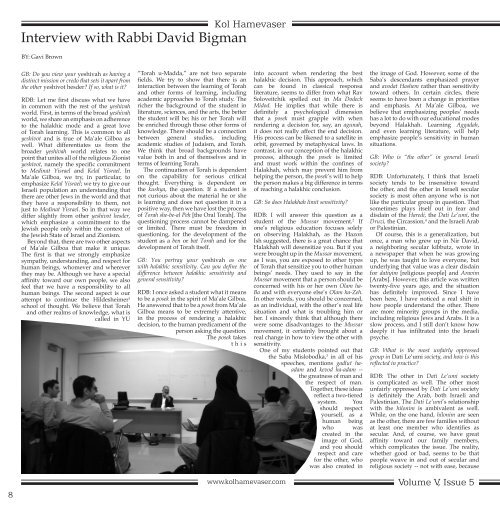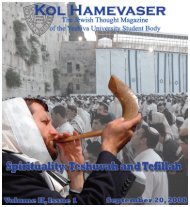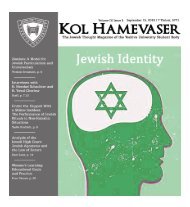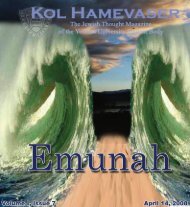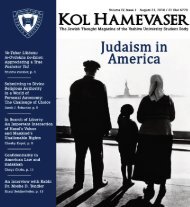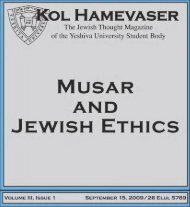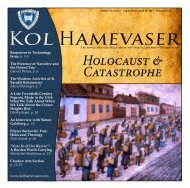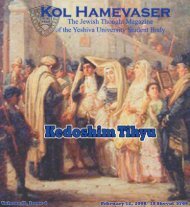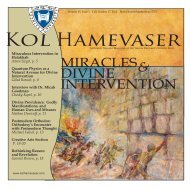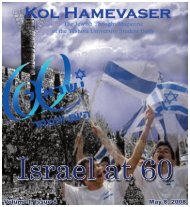The Other in Judaism - Kol Hamevaser
The Other in Judaism - Kol Hamevaser
The Other in Judaism - Kol Hamevaser
You also want an ePaper? Increase the reach of your titles
YUMPU automatically turns print PDFs into web optimized ePapers that Google loves.
Interview with Rabbi David Bigman<br />
BY: Gavi Brown<br />
<strong>Kol</strong> <strong>Hamevaser</strong><br />
GB: Do you view your yeshivah as hav<strong>in</strong>g a<br />
dist<strong>in</strong>ct mission or credo that sets it apart from<br />
the other yeshivot hesder If so, what is it<br />
RDB: Let me first discuss what we have<br />
<strong>in</strong> common with the rest of the yeshivah<br />
world. First, <strong>in</strong> terms of the broad yeshivah<br />
world, we share an emphasis on adherence<br />
to the halakhic mode and a great love<br />
of Torah learn<strong>in</strong>g. This is common to all<br />
yeshivot and is true of Ma’ale Gilboa as<br />
well. What differentiates us from the<br />
broader yeshivah world relates to one<br />
po<strong>in</strong>t that unites all of the religious Zionist<br />
yeshivot, namely the specific commitment<br />
to Med<strong>in</strong>at Yisrael and Kelal Yisrael. In<br />
Ma’ale Gilboa, we try, <strong>in</strong> particular, to<br />
emphasize Kelal Yisrael; we try to give our<br />
Israeli population an understand<strong>in</strong>g that<br />
there are other Jews <strong>in</strong> the world and that<br />
they have a responsibility to them, not<br />
just to Med<strong>in</strong>at Yisrael. So <strong>in</strong> that way we<br />
differ slightly from other yeshivot hesder,<br />
which emphasize a commitment to the<br />
Jewish people only with<strong>in</strong> the context of<br />
the Jewish State of Israel and Zionism.<br />
Beyond that, there are two other aspects<br />
of Ma’ale Gilboa that make it unique.<br />
<strong>The</strong> first is that we strongly emphasize<br />
sympathy, understand<strong>in</strong>g, and respect for<br />
human be<strong>in</strong>gs, whomever and wherever<br />
they may be. Although we have a special<br />
aff<strong>in</strong>ity toward our own people, we also<br />
feel that we have a responsibility to all<br />
human be<strong>in</strong>gs. <strong>The</strong> second aspect is our<br />
attempt to cont<strong>in</strong>ue the Hildesheimer 1<br />
school of thought. We believe that Torah<br />
and other realms of knowledge, what is<br />
called <strong>in</strong> YU<br />
“Torah u-Madda,” are not two separate<br />
fields. We try to show that there is an<br />
<strong>in</strong>teraction between the learn<strong>in</strong>g of Torah<br />
and other forms of learn<strong>in</strong>g, <strong>in</strong>clud<strong>in</strong>g<br />
academic approaches to Torah study. <strong>The</strong><br />
richer the background of the student <strong>in</strong><br />
literature, sciences, and the arts, the better<br />
the student will be; his or her Torah will<br />
be enriched through those other forms of<br />
knowledge. <strong>The</strong>re should be a connection<br />
between general studies, <strong>in</strong>clud<strong>in</strong>g<br />
academic studies of <strong>Judaism</strong>, and Torah.<br />
We th<strong>in</strong>k that broad backgrounds have<br />
value both <strong>in</strong> and of themselves and <strong>in</strong><br />
terms of learn<strong>in</strong>g Torah.<br />
<strong>The</strong> cont<strong>in</strong>uation of Torah is dependent<br />
on the capability for serious critical<br />
thought. Everyth<strong>in</strong>g is dependent on<br />
the kushya, the question. If a student is<br />
not curious about the material he or she<br />
is learn<strong>in</strong>g and does not question it <strong>in</strong> a<br />
positive way, then we have lost the process<br />
of Torah she-be-al Peh [the Oral Torah]. <strong>The</strong><br />
question<strong>in</strong>g process cannot be dampened<br />
or limited. <strong>The</strong>re must be freedom <strong>in</strong><br />
question<strong>in</strong>g, for the development of the<br />
student as a ben or bat Torah and for the<br />
development of Torah itself.<br />
GB: You portray your yeshivah as one<br />
with halakhic sensitivity. Can you def<strong>in</strong>e the<br />
difference between halakhic sensitivity and<br />
general sensitivity<br />
RDB: I once asked a student what it means<br />
to be a posek <strong>in</strong> the spirit of Ma’ale Gilboa.<br />
He answered that to be a posek from Ma’ale<br />
Gilboa means to be extremely attentive,<br />
<strong>in</strong> the process of render<strong>in</strong>g a halakhic<br />
decision, to the human predicament of the<br />
person ask<strong>in</strong>g the question.<br />
<strong>The</strong> posek takes<br />
this<br />
<strong>in</strong>to account when render<strong>in</strong>g the best<br />
halakhic decision. This approach, which<br />
can be found <strong>in</strong> classical responsa<br />
literature, seems to differ from what Rav<br />
Soloveitchik spelled out <strong>in</strong> Ma Dodech<br />
Midod. He implies that while there is<br />
def<strong>in</strong>itely a psychological dimension<br />
that a posek must grapple with when<br />
render<strong>in</strong>g a decision for, say, an agunah,<br />
it does not really affect the end decision.<br />
His process can be likened to a satellite <strong>in</strong><br />
orbit, governed by metaphysical laws. In<br />
contrast, <strong>in</strong> our conception of the halakhic<br />
process, although the posek is limited<br />
and must work with<strong>in</strong> the conf<strong>in</strong>es of<br />
Halakhah, which may prevent him from<br />
help<strong>in</strong>g the person, the posek’s will to help<br />
the person makes a big difference <strong>in</strong> terms<br />
of reach<strong>in</strong>g a halakhic conclusion.<br />
GB: So does Halakhah limit sensitivity<br />
RDB: I will answer this question as a<br />
student of the Mussar movement. 2 If<br />
one’s religious education focuses solely<br />
on observ<strong>in</strong>g Halakhah, as the Hazon<br />
Ish suggested, there is a great chance that<br />
Halakhah will desensitize you. But if you<br />
were brought up <strong>in</strong> the Mussar movement,<br />
as I was, you are exposed to other types<br />
of Torah that sensitize you to other human<br />
be<strong>in</strong>gs’ needs. <strong>The</strong>y used to say <strong>in</strong> the<br />
Mussar movement that a person should be<br />
concerned with his or her own Olam ha-<br />
Ba and with everyone else’s Olam ha-Zeh.<br />
In other words, you should be concerned,<br />
as an <strong>in</strong>dividual, with the other’s real life<br />
situation and what is troubl<strong>in</strong>g him or<br />
her. I s<strong>in</strong>cerely th<strong>in</strong>k that although there<br />
were some disadvantages to the Mussar<br />
movement, it certa<strong>in</strong>ly brought about a<br />
real change <strong>in</strong> how to view the other with<br />
sensitivity.<br />
One of my students po<strong>in</strong>ted out that<br />
the Saba Mislobodka, 3 <strong>in</strong> all of his<br />
speeches, mentions gadlut haadam<br />
and kevod ha-adam --<br />
the greatness of man and<br />
the respect of man.<br />
Together, these ideas<br />
reflect a two-tiered<br />
system. You<br />
should respect<br />
yourself, as a<br />
human be<strong>in</strong>g<br />
who was<br />
created <strong>in</strong> the<br />
image of God,<br />
and you should<br />
respect and care<br />
for the other, who<br />
was also created <strong>in</strong><br />
the image of God. However, some of the<br />
Saba’s descendants emphasized prayer<br />
and avodat Hashem rather than sensitivity<br />
toward others. In certa<strong>in</strong> circles, there<br />
seems to have been a change <strong>in</strong> priorities<br />
and emphasis. At Ma’ale Gilboa, we<br />
believe that emphasiz<strong>in</strong>g peoples’ needs<br />
has a lot to do with our educational modes<br />
beyond Halakhah. Learn<strong>in</strong>g Aggadah,<br />
and even learn<strong>in</strong>g literature, will help<br />
emphasize people’s sensitivity <strong>in</strong> human<br />
situations.<br />
GB: Who is “the other” <strong>in</strong> general Israeli<br />
society<br />
RDB: Unfortunately, I th<strong>in</strong>k that Israeli<br />
society tends to be <strong>in</strong>sensitive toward<br />
the other, and the other <strong>in</strong> Israeli secular<br />
society is most often anyone who is not<br />
like the particular group <strong>in</strong> question. That<br />
sometimes plays itself out <strong>in</strong> fear and<br />
disda<strong>in</strong> of the Haredi, the Dati Le’umi, the<br />
Druzi, the Circassion, 4 and the Israeli Arab<br />
or Palest<strong>in</strong>ian.<br />
Of course, this is a generalization, but<br />
once, a man who grew up <strong>in</strong> Nir David,<br />
a neighbor<strong>in</strong>g secular kibbutz, wrote <strong>in</strong><br />
a newspaper that when he was grow<strong>in</strong>g<br />
up, he was taught to love everyone, but<br />
underly<strong>in</strong>g that value was a clear disda<strong>in</strong><br />
for datiyim [religious people] and Aravim<br />
[Arabs]. However, this article was written<br />
twenty-five years ago, and the situation<br />
has def<strong>in</strong>itely improved. S<strong>in</strong>ce I have<br />
been here, I have noticed a real shift <strong>in</strong><br />
how people understand the other. <strong>The</strong>re<br />
are more m<strong>in</strong>ority groups <strong>in</strong> the media,<br />
<strong>in</strong>clud<strong>in</strong>g religious Jews and Arabs. It is a<br />
slow process, and I still don’t know how<br />
deeply it has <strong>in</strong>filtrated <strong>in</strong>to the Israeli<br />
psyche.<br />
GB: What is the most unfairly oppressed<br />
group <strong>in</strong> Dati Le’umi society, and how is this<br />
reflected <strong>in</strong> practice<br />
RDB: <strong>The</strong> other <strong>in</strong> Dati Le’umi society<br />
is complicated as well. <strong>The</strong> other most<br />
unfairly oppressed by Dati Le’umi society<br />
is def<strong>in</strong>itely the Arab, both Israeli and<br />
Palest<strong>in</strong>ian. <strong>The</strong> Dati Le’umi’s relationship<br />
with the hilonim is ambivalent as well.<br />
While, on the one hand, hilonim are seen<br />
as the other, there are few families without<br />
at least one member who identifies as<br />
secular. And, of course, we have great<br />
aff<strong>in</strong>ity toward our family members,<br />
which complicates the issue. <strong>The</strong> reality,<br />
whether good or bad, seems to be that<br />
people weave <strong>in</strong> and out of secular and<br />
religious society -- not with ease, because<br />
8<br />
www.kolhamevaser.com<br />
Volume V, Issue 5


